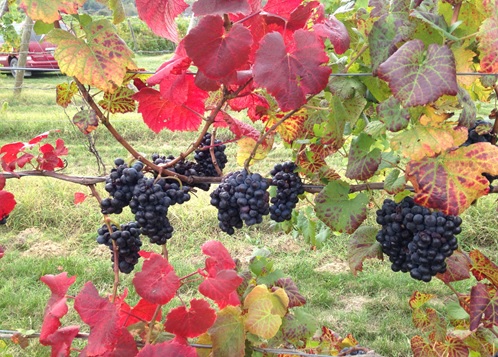
Michigan grapes. Image: Steven Schultze.
By Natasha Blakely
Good news for Michigan vineyards: the time grapes have to ripen has dramatically increased over the past few decades.
“It’s nearly grown an entire month in just four decades,” said Steven Schultze, an assistant professor at the University of South Alabama.
He discovered the shift while he was still a doctoral candidate at Michigan State University.
“One of our biggest findings, just since 1971, the growing season in southwest Michigan has increased by 28.8 days,” Schultze said.
Michigan has been growing grapes for a long time, mostly for juice and jams. It was only in the late 1960s that most of the state’s vineyards tried growing wine grapes, said Schultze.
The state has 15,000 acres of grapes, a fifth of those are wine grapes, said Paolo Sabbatini, an associate professor with the department of horticulture at Michigan State University. That puts Michigan at fifth in the U.S. for acreage. It is also among the top 10 wine producers in the country.
The reason for this shift is the change in climate over the past few decades. The study by Schultze found that there has been a warming trend in Michigan, with warmer springs and more frost-free days.
“There are a million bad things that will and have happened with climate change,” said Schultze. “The thing is, this is a good thing.”
That month means a lot. There are more days for the grapes to ripen. Varieties that take longer to ripen are now viable for Michigan vineyards, including more varieties of grapes for red wines, Sabbatini said.
“Michigan is known for growing excellent white wines,” Sabbatini said. “Whites are varieties that require not a very long season. The problem in Michigan was always we had challenges in growing reds and in the U.S. most of the market for wines are in the red.”
One of the reasons Michigan is good for grapes is the stability of its weather, particularly near the Great Lakes. Lake Michigan in particular prevents the temperature from dropping low enough during the winter and climbing high enough in the summer to kill the vines, Schultze said.

The Michigan wine industry has grown since the 1970s, according to Michigan State University. Photo: RaeAllen (flickr)
“The bad news is that the wine grapes, they don’t handle frost well,” Schultze said. The warmer spring is causing the grapes to come out of dormancy sooner, which puts them at more risk of getting frost. If they get frost once they’ve budded, then it’s over.
Wine grapes are more sensitive to extremes in the weather, and the climate change has caused some fluctuation.
“What we’ve noticed is these wild, crazy swings in the wintertime, super cold, and in the summer super dry,” said Glen Greiffendorf, the viticulturist and winemaker at 12 Corners Vineyard in Benton Harbor. “This year we had to trim the crop back some, just because there wasn’t enough water.”
St Julian Winery, one of the largest and oldest wineries in Michigan, has also been experiencing these negative changes.
“Early 2014 we saw temperatures dip -20 F for more than 4 days at a time,” said Nancie Oxley, a winemaker at St Julian Winery. “Most growers saw almost complete devastation on vitis vinifera varietals and severe damage on the French American varietals.”
The year 2014 was the smallest vintage that St. Julian experienced in more than three decades, she said.
It isn’t all bad though. Halfway through this year’s season St Julian’s harvest appears bountiful, said Oxley, and the varietals still on the vine are looking to turn out well too.
This pattern doesn’t seem to be out of character for Michigan vineyards.
“Usually we’re happy to get two to three (years) in 10 that are super perfect years where there’s not a lot of rain, not a lot of humidity and nice dry fall, the harvest comes off real well,” Greiffendorf said. “We’ve probably been getting another extra one out of 10.”
The changes in climate have had good effects, and though frost is a problem, grape growers have ways to handle it. As Schultze said, this is a good thing.
“It’s getting better and better,” said Sabbatini. “Because we can choose varieties that ripen later, prune the vines differently, there are ways to fight the frost.”
Ian Wendrow contributed to this report.